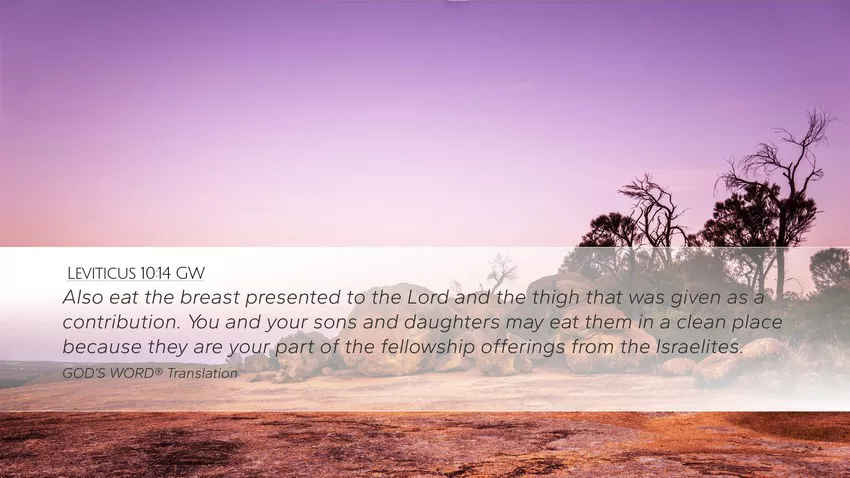Read the Daily Bible Verse – Leviticus 10:14 To Strengthen Your Spiritual Journey.
Leviticus 10:14 is a verse that may seem specific to the ancient Israelite priesthood, but it carries profound lessons for Christians today. This verse is part of a larger narrative in Leviticus that emphasizes the importance of holiness, obedience, and the proper handling of sacred things. In this article, we will explore the context, meaning, and application of Leviticus 10:14, drawing connections between the duties of the priests and the responsibilities of believers in the modern era.
The Context of Leviticus 10:14 KJV
Leviticus 10:14 is set in the aftermath of a tragic event involving Aaron‘s sons, Nadab and Abihu. These two priests offered “strange fire” before the Lord, which He had not commanded, and as a result, they were consumed by fire from the Lord (Leviticus 10:1-2). This event serves as a sobering reminder of the seriousness with which God views obedience and holiness.
Following this incident, God gives specific instructions to Aaron and his remaining sons, Eleazar and Ithamar, regarding their priestly duties. These instructions include how to handle the offerings and the portions that are to be eaten by the priests and their families. Leviticus 10:14 is part of these instructions, focusing on the wave breast and heave shoulder, which are portions of the peace offering.
Leviticus 10:14 (KJV)
“And the wave breast and heave shoulder shall ye eat in a clean place; thou, and thy sons, and thy daughters with thee: for they be thy due, and thy sons’ due, which are given out of the sacrifices of peace offerings of the children of Israel.”
This verse specifies that the wave breast and heave shoulder, which are parts of the peace offering, are to be eaten by the priests and their families in a clean place. These portions are described as the priests’ due, given to them from the sacrifices of the people.
Leviticus 10:14 Meaning
The wave breast and heave shoulder were specific parts of the peace offering that were set apart for the priests and their families. The wave breast was waved before the Lord as a gesture of offering, and the heave shoulder was lifted up in dedication to God. These actions symbolized the giving of these portions to God, who in turn provided them for the sustenance of the priests.
The instruction to eat these portions in a clean place underscores the importance of maintaining ritual purity and holiness. The priests were to consume these sacred portions in a manner that reflected their holy status and their role as mediators between God and the people.
The phrase “for they be thy due, and thy sons’ due” highlights that these portions were a rightful provision for the priests and their families. This provision was part of God’s design to care for those who served in His tabernacle, ensuring that they were supported by the offerings of the people.
Leviticus 10:14 Application in Life
While Leviticus 10:14 is specifically about the duties of the priests, its principles can be applied to the lives of Christians today. Here are some ways in which this verse can inform our faith and practice:
1. Recognizing God’s Provision
The wave breast and heave shoulder were provisions for the priests, given by God through the offerings of the people. This reminds us that God provides for those who serve Him. For Christians, this can be seen in the way God provides for our needs through various means, including the support of the church community.
2. Maintaining Holiness
The instruction to eat the sacred portions in a clean place emphasizes the importance of holiness. For Christians, this means striving to live lives that are set apart for God, avoiding sin, and seeking to honor Him in all that we do. Just as the priests were to maintain ritual purity, we are called to pursue spiritual purity.
3. Honoring Sacred Responsibilities
The priests had specific responsibilities regarding the offerings, and they were to handle these sacred duties with care and reverence. Similarly, Christians have responsibilities in their service to God, whether in ministry, worship, or daily life. We are called to approach these responsibilities with a sense of reverence and dedication.
4. Supporting Those Who Serve
The provision of the wave breast and heave shoulder for the priests and their families highlights the importance of supporting those who serve in ministry. In the New Testament, this principle is echoed in passages that encourage the support of pastors, missionaries, and other church workers (1 Corinthians 9:14, 1 Timothy 5:17-18).
5. Gratitude and Generosity
The peace offering was an expression of gratitude and fellowship with God. The sharing of the wave breast and heave shoulder with the priests and their families reflects a spirit of generosity and community. Christians are called to cultivate gratitude and generosity, sharing what God has given us with others.
Conclusion
Leviticus 10:14, though rooted in the specific context of the Israelite priesthood, offers valuable lessons for Christians today. It reminds us of God’s provision, the importance of maintaining holiness, and the need to honor our sacred responsibilities. It also underscores the value of supporting those who serve in ministry and cultivating a spirit of gratitude and generosity.
As we reflect on this verse, let us be encouraged to live lives that are set apart for God, recognizing His provision and seeking to honor Him in all that we do. Let us also remember to support those who serve in ministry and to share the blessings we have received with others, reflecting the love and generosity of our Heavenly Father.
Related topics:


